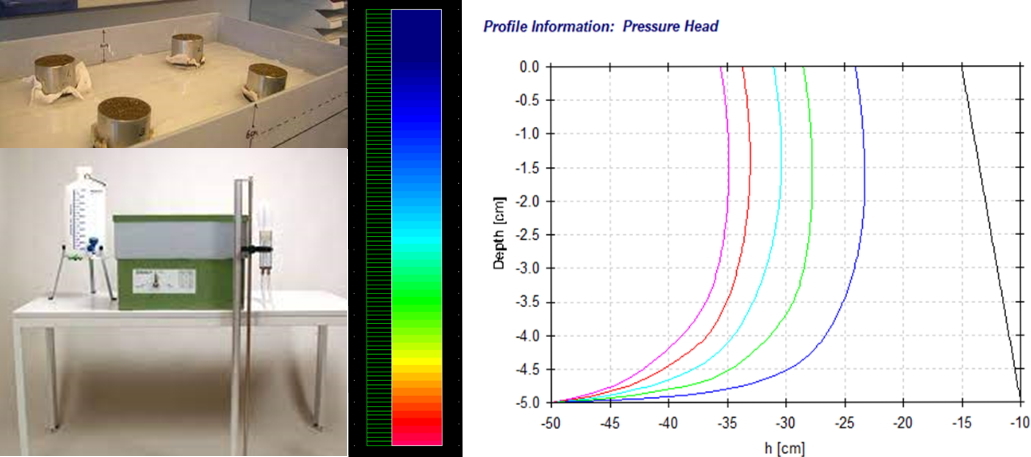Exercise course: Simulation exercises in soil physics with Hydrus 1D (BSc, WV05) (20480)
WS 2022/2023
Fr.: 13:00-15:00; PC-Pool 24b
Efstathios Diamantopoulos

This course offers an introduction to water flow simulations with Hydrus 1D. The course targets two important spatial scales in soil physics/soil hydrology: the laboratory (small lab-columns, 5-100 cm) scale and the field (pedon 1-10m) scale. The students will learn basic terminology of water flow simulations, basic assumptions behind simulations with Hydrus 1D, set-up and run their own simulations, work with the output files, plot data, and draw conclusions from their simulations results. The course is organized as a series of short lectures followed by computer exercises. The main parts are:
- Introduction to the course and to the theory of simulating water flow with Richards equation, Essentials to Numerical Solutions and terminology
- Introduction to Hydrus 1D and first simulations
- Lab-scale: Simulating the laboratory method for measurement of Water Retention Curves, (how much time does it take for our samples to reach equilibrium conditions, how is the spatial distribution of matric potential in the soil column)
- From Lab data to simulations. How to convert WRC data into mathematical models of the water retention curve (RETC)
- Lab-scale: Simulating the laboratory method for the estimation of Ksat and K(h) (Darcy equation).
- From Lab data to simulations. How to convert lab data into mathematical models of the Soil Hydraulic Properties (RETC)
- Lab-scale: Simulating Infiltration experiments of water into soil columns, (effect of Boundary Conditions)
- Field-scale: Drainage of a soil profile due to gravity and due to Evaporation and Root Water Uptake, Discussion of the following concepts: Field capacity, Permanent Wilting point, Available water content and storage.
- Field-scale: Simulating steady state water profiles above a water table (effect of precipitation and/or evaporation)
- Field-scale: Simulating multiyear water dynamics under realistic BCs. What is the difference in the main water balance components between a wet and a dry year, for different soil types?
- Field-scale: Heat transport in soils. How fast are different soil profiles warming up in a specific day, but also in a specific season?
Course objective
Knowledge
- Acquire theoretical knowledge on simulating water flow in porous media/soils
- Extend your knowledge on measurement principle in soil physics lab
Skills
- Design, set up, run a 1D simulation of water flow with Hydrus 1D
- Work with output files, import them into excel and do post-processing
- Fit mathematical equations to data
Competences
- Assess different soil types with respect of soil hydrology, hydrology, and eco-hydrology
- Assess the soil as a growth medium for plants in general
<< Back to list of teaching courses

